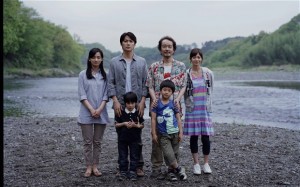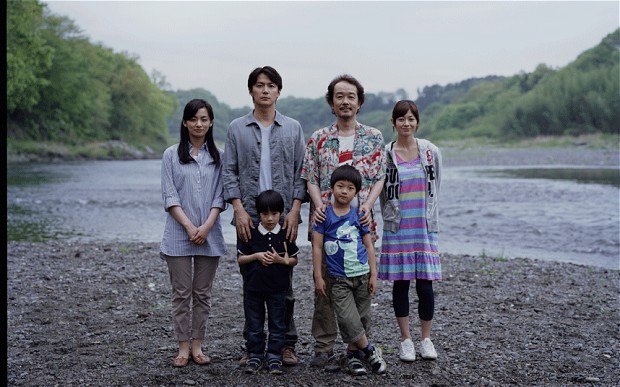 This wonderfully thought-provoking and poignant Japanese family drama that was celebrated at Cannes and directed by Hirokazu Kore-eda invites all kinds of questions. Can love develop naturally as strongly as love that is physically innate, and biologically persuaded? At Like Father, Like Son‘s core is the nature vs nurture debate. What really determines who we are more, genes or upbringing? Are we a blank canvas when brought into the world?
This wonderfully thought-provoking and poignant Japanese family drama that was celebrated at Cannes and directed by Hirokazu Kore-eda invites all kinds of questions. Can love develop naturally as strongly as love that is physically innate, and biologically persuaded? At Like Father, Like Son‘s core is the nature vs nurture debate. What really determines who we are more, genes or upbringing? Are we a blank canvas when brought into the world?
The film begins with a young, affluent couple, architect Ryota Nonomiya (Masaharu Fukuyama) and his wife Midori (Machika Ono), at a public school interview with their six-year-old child Keita. It goes well, mostly because his answers were rehearsed and embellished beforehand. Later at home in their expensive Tokyo apartment, Ryota insists that his son practices his piano so he doesn’t fall behind. As an emotionally reserved work addict, and seems to be forcing his relentless drive to achieve onto Keita.
Midori receives a phone call from the hospital she chose to give birth in. After a meeting with doctors, the couple discover the startling and saddening news that their child is in fact not their own, there was confusion on the day of the birth. Midori immediately feels guilty that she didn’t know, while Ryota just utters “it all makes sense now”. In other words, his son has never been as gifted as him.
There’s another family, and when the two meet the contrast between them is clear. One is white collar and wealthy, the other is blue collar and poor. One husband is an executive with no clue when to stop, even the ordeal won’t tear him away from the office, while the other runs a shabby electricians store and his motto is “save until tomorrow what you can”. The poorer family however, radiate happiness and warmth. They have two other children, and play with them constantly. Key here is a touching sentiment that essentially, money cannot buy happiness and financial security and a decent education are not superior to a loving, supportive home. Ryota’s arrogrance is clear from the start, but he develops endearingly, forming realizations about the real nature of fatherhood in an entirely plausible way. The two families begin to spend time with their own offspring, for weekends at a time. The way it unravels is fascinating, heart-rendering and at times very funny. It’s surprisingly uplifting considering the sadness that resonates through it.
It’s unthinkable to not dissect this impossible situation, pick it apart and ponder it from all angles. Like Father, Like Son indeed does this too. It’s a substantial two hours and enough time to really explore the characters in depth with serious emotional intelligence. In fact, it could have gone on for longer and still kept the audience engrossed. The scenario isn’t black and white, of course it isn’t, and Kore-eda really excels at exploring everything inbetween; the complexity of the relationships and the shifting affectations. There are peaks and troughs, highs and lows. It’s an awful situation, but from it valuable lessons are learned. A charming and deeply impressionable film.
This review comes from a screening at the 57th BFI London Film Festival 2013 (LFF 2013).




